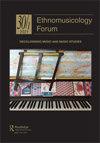Editorial
IF 0.5
1区 艺术学
0 MUSIC
引用次数: 0
Abstract
We complete the 30th volume of Ethnomusicology Forum following another year living with the COVID-19 virus. As the year ends and we see the rise of another variant of concern, the editors reflect on the impact of the Omicron variant on borders and their closure. As Omicron migrates and spreads, borders have been shut and connections with southern and western Africa in particular have been impacted. Many borders between parts of the Global North remain open, however, despite rising numbers of cases in these locations. Why are certain governments so quick to stop movement from some of the poorest regions of the world, but retain unrestricted movement with close neighbors with whom they share economic might? And at the same time, as booster vaccines campaigns in the Global North kick into high gear, closed-off countries of the South struggle to get first doses to their populations. Borders generate inequity, and whilst the British Forum for Ethnomusicology alongside the editors of Ethnomusicology Forum hold no sway over UK political decision-making, we can offer ways to open virtual borders and encourage conversation between scholars caught on different sides of government-imposed divides. During the autumn one-day conference – which actually took place over two days online in mid-November – the program committee brought together scholars at many different stages of their careers from North America, South America, Asia, Australia, and Europe to discuss ‘Ethnomusicology in 2022 and Beyond’. This year marked the first time that the BFE Executive Committee hosted the conference via the Zoom platform, enabling ethnomusicologists across disparate time zones to share ideas. On the Ethnomusicology Forum editorial team, we further seek to tear down borders with a new initiative to appoint four copy editors who will assist in the preparation of scholarly pieces written by those who have English as a second or third (or fourth!) language. We look forward to hearing new voices in the pages of our journal, so please send in your articles for peer-review! In this issue, we are very pleased to present six stand-alone articles of original research. We open with two articles that engage with folklore and folk revivals in Europe and South America. First, Felix Morgenstern investigates the fascinating presence of Irish music in East Germany during the last two decades of the Cold War as a way for musicians to foreground anti-colonial and anti-imperialist sentiment during an East German folk revival. Deploying Svetlana Boym’s term ‘sideways nostalgia’, Morgenstern explains how German bands adopted Irish rebel songs as a way to rebuild a sense of cultural identity and ‘lost German national pride’ in the fraught and contentious post-war period. Secondly, María Bernardita Batlle Lathrop evaluates the life and work of Violeta Parra, a Chilean singer and folklorist who popularised rural musical practice in urban Chile and further afield during the middle of the twentieth century. As a cantora (singer) and cantautora (singer-songwriter) she composed many new tunes with themes related to social justice and carved a new place for women’s performance in Chile. Both Morgenstern and Batlle Lathrop introduce and analyse a number of powerful tunes of potential interest to readers both for their own listening and for teaching exercises in the classroom.编辑
在与新冠肺炎病毒共存一年后,我们完成了民族音乐论坛的第30卷。随着今年的结束,我们看到另一种令人担忧的变种的出现,编辑们反思了奥密克戎变种对边境及其关闭的影响。随着奥密克戎的迁移和传播,边境被关闭,尤其是与南部和西部非洲的联系受到了影响。然而,尽管全球北部部分地区的病例数量不断上升,但这些地区之间的许多边界仍然开放。为什么某些政府如此迅速地阻止来自世界上一些最贫穷地区的流动,却与他们有共同经济实力的近邻保持不受限制的流动?与此同时,随着全球北方的加强疫苗运动进入高潮,封闭的南方国家正在努力为其人口接种第一剂疫苗。边界产生了不平等,虽然英国民族音乐论坛和民族音乐论坛的编辑对英国的政治决策没有影响力,但我们可以提供开放虚拟边界的方法,鼓励处于政府强加的分歧不同一边的学者之间进行对话。在为期一天的秋季会议上,项目委员会召集了来自北美、南美、亚洲、澳大利亚和欧洲的处于职业生涯许多不同阶段的学者,讨论“2022年及以后的民族音乐学”。今年是BFE执行委员会首次通过Zoom平台主办会议,使不同时区的民族音乐学家能够分享想法。在民族音乐论坛编辑团队中,我们进一步寻求通过一项新的举措来打破边界,任命四名文案编辑,他们将协助那些将英语作为第二或第三(或第四!)语言的人撰写学术文章。我们期待着在我们杂志的页面上听到新的声音,所以请将您的文章发送给同行评审!在本期中,我们非常高兴地呈现六篇独立的原创研究文章。我们以两篇关于欧洲和南美洲民间传说和民间复兴的文章开场。首先,Felix Morgenstern调查了冷战最后二十年爱尔兰音乐在东德的迷人存在,以此作为音乐家在东德民间复兴期间表达反殖民和反帝国主义情绪的一种方式。Morgenstern借用了Svetlana Boym的术语“横向怀旧”,解释了德国乐队如何采用爱尔兰反叛歌曲来重建文化认同感,并在充满争议的战后时期“失去了德国民族自豪感”。其次,María Bernardita Batlle Lathrop评价了智利歌手和民俗学家Violeta Parra的生活和工作,她在20世纪中期在智利城市和更远的地方推广了乡村音乐实践。作为一名歌手和创作歌手,她创作了许多与社会正义有关的新曲,并为智利的女性表演开辟了新的天地。Morgenstern和Batlle Lathrop都介绍和分析了一些读者可能感兴趣的强有力的曲调,无论是为了他们自己的听力还是为了课堂教学练习。
本文章由计算机程序翻译,如有差异,请以英文原文为准。
求助全文
约1分钟内获得全文
求助全文
来源期刊

Ethnomusicology Forum
MUSIC-
CiteScore
1.10
自引率
25.00%
发文量
29
期刊介绍:
Articles often emphasise first-hand, sustained engagement with people as music makers, taking the form of ethnographic writing following one or more periods of fieldwork. Typically, ethnographies aim for a broad assessment of the processes and contexts through and within which music is imagined, discussed and made. Ethnography may be synthesised with a variety of analytical, historical and other methodologies, often entering into dialogue with other disciplinary areas such as music psychology, music education, historical musicology, performance studies, critical theory, dance, folklore and linguistics. The field is therefore characterised by its breadth in theory and method, its interdisciplinary nature and its global perspective.
 求助内容:
求助内容: 应助结果提醒方式:
应助结果提醒方式:


